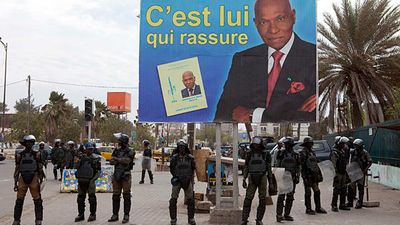Senegal's recent presidential election saw Abdoulaye Wade fighting for a third term in office despite prominent protests calling for the 85-year-old to let go of his reign. The message heard around the African continent is that Africans have had enough - enough of leaders who don't want to leave their posts when it's time. Counting the number of African heads of state that have come into power, after independence, and have breached or amended policies to suit their megalomaniac quests for absolute power is far from a difficult task. Over half of the world’s top ten longest ruling non-royal leaders hail from Africa with almost no end in sight to their divine right-like presidencies. In a continent where at least 40% of the population is below the age of 15, it’s astounding to think that many citizens in various nations have never seen more than one president in their lifetime.
From the infamous and controversial 87-year-old Robert Mugabe of Zimbabwe - who has been the president of that country since 1987, to the younger but just as outspoken leader of The Gambia - Yahya Jammeh - who was re-elected for the third time since 1996 and vowed to rule for another billion years (God willing). Over in the Democratic Republic of Congo, President Joseph Kabila was controversially re-elected last year for a second term, since 2001, as the country’s head of state, with the usual accusations of voter fraud and intimidation of opposition leaders and voters that have come to be part of the status quo surrounding elections in African nations.
Unfortunately, the competition of who can re-elect themselves the most or stay in power the longest doesn’t end there. Burkinabe President Blaise Compaoré, who famously ousted preceding president Thomas Sankara in a coup, has spent a comfortable 24 years as the country’s President – with the exception of the 2011 Burkinabe Mutiny that forced the president to briefly flee from his presidential compound in the capital city. In February of last year, Ugandan incumbent President Yoweri Museveni once again sent the message that he was serious about abolishing a limit to presidential terms when he was re-elected to office after holding the post since the mid-80s. And let’s not forget Angolan president José Eduardo dos Santos who hasn’t budged from his position since 1979.
But if ever there were an award for the longest-standing African leader, we’d have to give first place to the recently re-elected Paul Biya of Cameroon who assumed office in 1975 and doesn’t like the idea of anyone messing with his political world record of almost 37 years in office.
Yet, in all this political stagnation there is still hope to be found. Around this time last year, the world witnessed an unprecedented eruption of civilian-led protests that shook-up the political climate in much of the Middle East and North Africa. These revolutionary uprisings permanently transformed social media and gave a new understanding to the phrase ‘power to the people’. The citizens of Tunisia, Egypt and Libya all succeeded in ousting the long-standing leaders of their countries – a never before seen ripple effect. The Arab Spring has had an immense and transformative effect in several African countries with recent “occupy” protests occurring in Nigeria, Senegal and Ghana.We are yet to see more leaders forced out of their tainted and never-ending presidencies but the political landscape of Africa seems to finally be reflecting the brewing sentiments of its populations.
